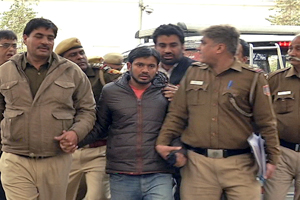New Delhi, Feb 17: JNU students' union President Kanhaiya Kumar, arrested in a sedition case in which anti- India slogans were allegedly raised in the university premises on February 9, was today remanded to judicial custody till March 2 by a Delhi court.
Kanhaiya was produced before the court, after the expiry of his police custody remand, amidst tight security and sloganeering by lawyers inside the court premises.
During the hearing before Metropolitan Magistrate Lovleen, only six lawyers representing Kanhaiya were allowed to be inside the court room along with a JNU professor and five journalists.
Kanhaiya was attacked by a group of persons when he was being escorted by police from the vehicle to the court room during which even the cops with him were beaten up.
A visibly shaken Kanhaiya was brought in the court room at 2.45 pm where an unidentified person tried to assault him.
During the hearing, which commenced at 3 pm, advocates Vrinda Grover and Sushil Bajaj, who appeared for Kanhaiya, told the magistrate that despite the Supreme Court direction, the police has failed to maintain the law and order as their client was assaulted inside court premises and even outside the door of the court room by the person.
The lawyers claimed that despite Kanhaiya asking the police officials to apprehend the person, who was trying to assault him near the gate of the court room, the police allowed that person to go scot free.
At this juncture the magistrate told the lawyers that he will call the doctors from the Patiala House Court dispensary to medically examine Kanhaiya inside the court room itself.
During the hearing, the investigating officers moved the application requesting the court to send Kanhaiya to judicial custody, saying he was not required for any custodial interrogation.
The court allowed the plea and remanded Kanhaiya to judicial custody till March 2.
During the hearing, Kanhaiya's counsel moved an application seeking direction to the jail superintendent to ensure safety and security of their client in the prison.
The court ordered the DCP (New Delhi) Jatin Narwal, who was present in the court room, to take appropriate action to ensure that Kanhaiya is being taken to the jail safely and also directed the jail authorities to ensure his safety there.
During the hearing, Kanhaiya's counsel apprised the Magistrate that the Supreme Court has appointed some senior advocates as court commissioners and they are on their way to Patiala House court.
The six member team of lawyers comprised Kapil Sibal, Rajeev Dhavan, Dushyant Dave, A D N Rao, Ajit Sinha and Harin Raval.
At around 3.25 pm, the team of SC-appointed commissioners came in the court and asked Kanhaiya and their counsel as to what has happened with the accused in the court premises today.
Initially, advocate Vrinda Grover briefed them about the assault and later on the commissioners asked Kanhaiya about the incident.
Narrating the incident, Kanhaiya told the commissioners that he was attacked by a group of mob while he was being escorted to the court room.
The commissioners then called DCP Narwal and asked him to explain about the failure of law and order despite the Supreme Court directive.
Narwal, however, told them that when the mob attacked Kanhaiya, even police personnel were beaten up and one of the cops was attacked with blade by those persons.
After 1.30 pm a group of men dressed as lawyers were shouting slogans and also tried to manhandle 3-4 persons during which the police intervened and escorted them out safely.
Openly defying the Supreme Court order, the group of men in lawyers' robes again attacked mediapersons and chanted slogans like "Vande Mataram" and waved the tri-colour.
Among the group of men was lawyer Vikram Chauhan and some others who had allegedly attacked journalists, teachers and students of JNU inside and outside the court two days back.
They managed to enter the court complex despite heavy police presence and yet again roughed up a few journalists, snatched their mobiles and deleted video footage. Police looked the other way, the journalists alleged.
Soon after the fresh assault, lawyers made a mention of the incidents before a Supreme Court bench which asked the counsel of Delhi Police to find out the situation at Patiala House Court and get back to it in ten minutes.
The team of senior advocates, after taking stock of the situation at Patiala House Court, informed the apex court that there is serious threat to safety of Kanhaiya who was beaten and pushed by unknown persons in the court.
After this the apex court directed the Delhi Police Commissioner to ensure safety of Kanhaiya and others who attended the proceedings in the court today.






Comments
Add new comment